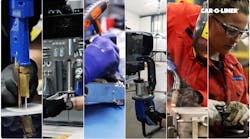Today's uncertain economy significantly impacts consumer vehicle buying decisions, according to the latest market study issued by R. L. Polk & Co.
In the study, Polk gathered consumer sentiment on the economy, and also about three key topics, including purchase horizon for next vehicles; new vs. used purchase plans; and an assessment of respondents' willingness to consider a domestic vehicle purchase.
Overall, nearly half of those surveyed indicated they believe the U.S. economy will worsen in the next year, while just 31 percent are optimistic and think the economic situation will improve.
"A state of optimism for the economy was also reflected in the study," says Lonnie Miller, director of industry analysis for Polk and co-author of the study. "Nearly one third of respondents plan to purchase a vehicle within twelve months." This suggests there is pent-up demand for vehicles as some consumers have been putting off their next vehicle purchase for some time now, according to Polk. The drop in sales from 16.1 million units in 2007 to 13.2 million units in 2008 supports that assessment.
Economic Concerns Drive Longer Vehicle Ownership
Vehicle retention trends tracked by Polk indicate consumers are choosing to keep their vehicle longer than in the past. Stemming from a separate registration-based analysis, Polk reports the average length of ownership of a new car or truck in 2008 was more than 4.5 years (56.3 months), compared with 49 months just six years ago. Supporting this trend, only 11 percent of consumers surveyed projected the length of ownership of their vehicle would not be impacted by current economic conditions.
Used Vehicles Receiving Increased Consideration
The study also found that many Americans are more likely to consider a cost-effective used vehicle for their next purchase. Seventy percent of those surveyed indicated they were at least somewhat likely to consider a used, rather than a new vehicle for their next vehicle purchase. Reports of growing used vehicle prices and demand for vehicles at auto auction centers reinforce this mindset.
Domestics Remain Relevant Purchase Choices
More than two thirds (72 percent) of respondents indicated they would consider a domestic vehicle as their next vehicle purchase to help stimulate the U.S. economy and support the domestic auto industry. This is a positive sign, given the current long-term outlook for domestic manufacturers.
Recommendations to Weather the Storm
Given the consumer mindset and current business climate, it makes sense for OEMs to reconsider some of the basic tenets of long term business planning. "Product development for future models needs to factor in and recognize a heightened level of consumer anxiety," says Bruce Giffin, corporate market research manager at Polk and co-author of the study. "OEMs should not emphasize consumers' current economic views too much; but instead, focus on accurately mapping out the volume of cars and trucks that will meet future demand."
In the U.S. market, Polk projects a return to the 14.2 million unit level by 2012. A growing number of loyalty teams have been formed within the manufacturing sector, providing a central focus on keeping customers once consumer confidence bounces back. "It's important that these teams remain focused on future business even if marketing budgets are tight," Giffin adds.
Polk reports it also has seen a shifting OEM attitude that places a stronger emphasis on the parts and service business. This strategy can be very profitable and can help minimize revenue shortfalls due to declining new vehicle sales. As consumers are holding on to their vehicles longer, now is the time for OEMs and dealers to foster new and even more relevant relationships with existing customers for potential business.

